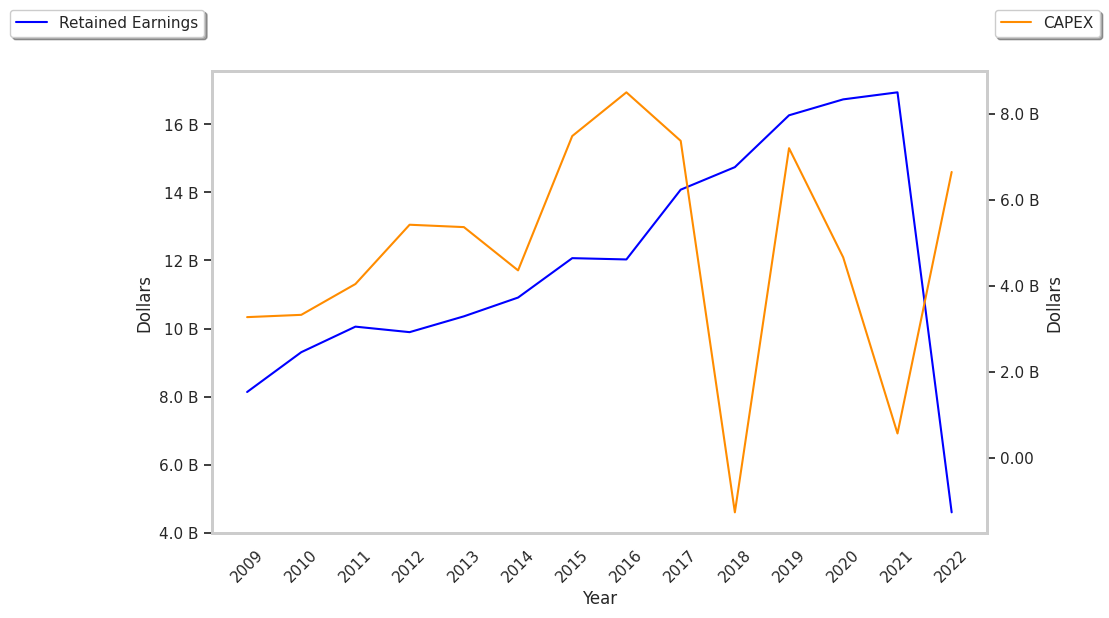Exelon logged a -0.5% change during today's morning session, and is now trading at a price of $45.98 per share.
Exelon returned gains of 17.1% last year, with its stock price reaching a high of $48.51 and a low of $35.94. Over the same period, the stock outperformed the S&P 500 index by 5.7%. More recently, the company's 50-day average price was $45.96. Exelon Corporation, a utility services holding company, engages in the energy distribution and transmission businesses. Based in Chicago, IL, the Large-Cap Utilities company has 20,014 full time employees. Exelon has returned a 3.4% dividend yield over the last 12 months, but this may not be sustainable seen that the company has a choppy cash flow record.
The Company May Be Profitable, but Its Balance Sheet Is Highly Leveraged:
| 2019 | 2020 | 2021 | 2022 | 2023 | 2024 | |
|---|---|---|---|---|---|---|
| Revenue (M) | $16,725 | $16,663 | $17,938 | $19,078 | $21,727 | $23,028 |
| Operating Margins | 16% | 13% | 15% | 17% | 19% | 19% |
| Net Margins | 18% | 12% | 10% | 11% | 11% | 11% |
| Net Income (M) | $3,028 | $1,954 | $1,829 | $2,171 | $2,328 | $2,460 |
| Net Interest Expense (M) | $1,591 | $1,610 | $1,264 | $1,422 | $1,704 | $1,889 |
| Depreciation & Amort. (M) | $5,780 | $6,527 | $7,573 | $3,533 | $3,506 | $2,910 |
| Diluted Shares (M) | 974 | 977 | 980 | 987 | 997 | 1,003 |
| Earnings Per Share | $3.01 | $2.01 | $1.74 | $2.2 | $2.34 | $2.45 |
| EPS Growth | n/a | -33.22% | -13.43% | 26.44% | 6.36% | 4.7% |
| Avg. Price | $29.55 | $25.76 | $31.5 | $42.91 | $35.9 | $46.23 |
| P/E Ratio | 9.78 | 12.82 | 18.1 | 25.39 | 20.06 | 24.59 |
| Free Cash Flow (M) | -$589 | -$3,813 | -$4,969 | -$2,277 | -$2,705 | -$1,528 |
| CAPEX (M) | $7,248 | $8,048 | $7,981 | $7,147 | $7,408 | $7,097 |
| EV / EBITDA | 8.66 | 7.97 | 7.06 | 13.43 | 11.62 | 14.48 |
| Total Debt (M) | $35,950 | $36,906 | $32,655 | $37,169 | $41,279 | $44,668 |
| Net Debt / EBITDA | 4.19 | 4.18 | 3.12 | 5.37 | 5.42 | 6.13 |
| Current Ratio | 0.85 | 0.98 | 0.87 | 0.69 | 0.82 | 0.87 |
Exelon's financial statements include several red flags such as declining EPS growth, negative cash flows, and not enough current assets to cover current liabilities because its current ratio is 0.87. Additionally, the firm has a highly leveraged balance sheet. On the other hand, the company benefits from growing revenues and a flat capital expenditure trend and decent operating margins with a positive growth rate.
a Lower P/B Ratio Than Its Sector Average but Its Shares Are Expensive:
Exelon has a trailing twelve month P/E ratio of 16.5, compared to an average of 21.16 for the Utilities sector. Based on its EPS guidance of $2.63, the company has a forward P/E ratio of 17.5. The -1.9% compound average growth rate of Exelon's historical and projected earnings per share yields a PEG ratio of -8.63. This indicates that its shares are overvalued.In contrast, the market is likely undervaluing Exelon in terms of its equity because its P/B ratio is 1.65 while the sector average is 2.36. The company's shares are currently trading 19.5% below their Graham number.
Exelon Has an Analyst Consensus of Some Upside Potential:
The 16 analysts following Exelon have set target prices ranging from $42.0 to $57.0 per share, for an average of $49.75 with a buy rating. The company is trading -7.6% away from its average target price, indicating that there is an analyst consensus of some upside potential.
Exelon has an average amount of shares sold short because 4.1% of the company's shares are sold short. Institutions own 90.3% of the company's shares, and the insider ownership rate stands at 0.12%, suggesting a small amount of insider investors. The largest shareholder is Vanguard Group Inc, whose 13% stake in the company is worth $6,002,099,590.



